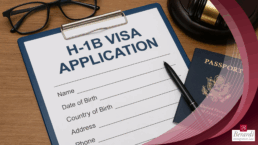On July 21, 2025, the Trump administration announced a proposal to eliminate the current random selection system for H-1B visas and replace it with a wage-based selection process. The new system would prioritize higher-paying job offers in the visa selection process, rather than relying on the randomized lottery currently in place. The rule is expected to be finalized ahead of the Fiscal Year 2027 H-1B cap season, which begins in March 2026.
This proposed rule would apply to the H-1B cap-subject registration process administered by U.S. Citizenship and Immigration Services (USCIS). Instead of selecting registrants randomly, USCIS would prioritize cases based on the highest Occupational Employment and Wage Statistics (OEWS) wage level offered, starting with Level IV and moving downward.
Understanding the H-1B Program
The H-1B visa allows U.S. employers to hire foreign workers in specialty occupations, defined under 8 C.F.R. § 214.2(h)(4)(ii) as roles requiring at least a bachelor’s degree in a specific field. Each year, 85,000 new H-1B visas are available: 65,000 under the regular cap and 20,000 for U.S. advanced degree holders, as authorized under the Immigration and Nationality Act (INA) § 214(g)(5)(C). Since 2020, USCIS has required employers to pre-register online for the annual H-1B selection process before submitting full petitions.
How the New Selection Would Work
Under the proposed rule, USCIS would prioritize registrations by wage level, starting with Level IV (positions requiring the highest level of expertise) and proceeding downward. This model was previously attempted in 2021 and aims to favor highly paid workers and limit misuse of the program.
Proponents of the rule argue that it would incentivize employers to offer higher wages to foreign workers and help protect U.S. workers from wage suppression. However, critics of the proposal caution that the change could disproportionately impact early-career professionals, international students transitioning from Optional Practical Training (OPT), nonprofit employers, and startups that may not be able to offer Level IV wages.
Legal Context and Next Steps
The proposal must go through the federal rulemaking process under the Administrative Procedure Act (5 U.S.C. § 553), including a public comment period. Legal challenges are possible, especially given that a similar 2021 rule was vacated due to procedural issues.
This policy could significantly restrict access to H-1B visas for early-career professionals and reshape how employers approach sponsorship. Berardi Immigration Law is closely monitoring these developments. If you are an employer or applicant with questions about how this may impact your H-1B strategy, please contact our office for individualized guidance and support.
Ready to have Berardi on your side?
Whether you’re a business looking to hire or a professional hoping to relocate, immigration law can be complicated. But you don’t have to do it alone. Put our experience to work for you.

